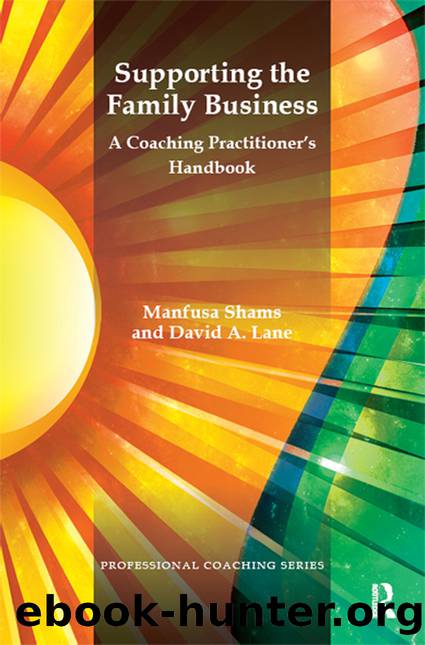Supporting the Family Business by Lane David A.;Shams Manfusa;

Author:Lane, David A.;Shams, Manfusa;
Language: eng
Format: epub
Publisher: Taylor & Francis Group
Learning from coaching outcomes
Drawing from a few key sources of research evidence in this area (e.g., Grant, Passmore, Cavanagh & Parker, 2010), the discussion in this section aims to demonstrate the need for integrating coaching outcomes from family business coaching into all other areas of coaching practice to develop coaching psychology.
A distinction must be made between the evaluation of coaching practice, usually from a coacheeâs perspective and/or from the service usersâ perspectives, and the evaluation of coaching outcomes to explore the effectiveness of the coaching approach and the tools and techniques used. While the evaluation exercise has been used quite extensively in coaching practices, however, the direct influence of coaching outcomes to develop a coachâs knowledge, understanding of, and insights in coaching practice is hardly documented in the literature, with no substantial research evidence in this area (Wasylyshyn, 2003).
The fine distinctive line between the evaluation exercise and the coaching outcome measure is that usually the evaluation exercise is carried out using a client/coachee satisfaction questionnaire, scales, surveys, psychometric tests, etc., to obtain responses from the coachees, while the assessment of coaching outcomes is expected to be developed from a learning perspective for coaching practitioners. However, there are overlapping issues. For example, evaluation exercises can provide significant insights in the effectiveness of coaching approach, and this can be added to any coaching outcome measure to obtain a robust understanding of the effectiveness of a coaching intervention, and to refine coaching practices from a learning perspective.
The self-reported satisfaction rating for coaching intervention is considered as an indicator of effectiveness of coaching outcomes. This is a simplistic view, as it does not consider any changes in coachesâ knowledge, understanding, and practice-related issues from the coaching intervention. This issue is still under-researched. The growing interest in developing the understanding of coaching outcomes in relation to effective coaching intervention was drawn mainly from outcomes of psychotherapy to demonstrate the benefits of measuring outcomes using relevant tools and techniques. There are a few published papers on the need to conduct research on the effectiveness of coaching outcomes to understand coach-coacheesâ relationships, coachesâ efficacy and competencies, and to develop coaching practice in general (OâBroin & Palmer, 2006). Although it is good practice to draw evidence from other disciplines about the benefits of coaching outcome measures to improve practice, we can only do this if we can establish similarity in the discipline areas, nature of interventions, tools, and techniques used. The most important issue in this context is the different nature of the discipline, since such similar measures for assessing coaching outcomes will not be appropriate. For example, coaching psychology is aiming to promote personal growth and wellbeing for non-clinical population groups, whereas, psychotherapy is aiming to intervene for improving any problem related to an individual, and may involve clinical assessments. This does not imply that there is a sharp distinction between these disciplines, rather their meeting points can be traced from the importance given to the application of transferable skills using a practice-based approach. For example, the
Download
This site does not store any files on its server. We only index and link to content provided by other sites. Please contact the content providers to delete copyright contents if any and email us, we'll remove relevant links or contents immediately.
| Administration & Medicine Economics | Allied Health Professions |
| Basic Sciences | Dentistry |
| History | Medical Informatics |
| Medicine | Nursing |
| Pharmacology | Psychology |
| Research | Veterinary Medicine |
The Art of Thinking Clearly by Rolf Dobelli(10451)
The 5 Love Languages: The Secret to Love That Lasts by Gary Chapman(9784)
Mindhunter: Inside the FBI's Elite Serial Crime Unit by John E. Douglas & Mark Olshaker(9318)
Becoming Supernatural by Dr. Joe Dispenza(8199)
Nudge - Improving Decisions about Health, Wealth, and Happiness by Thaler Sunstein(7690)
The Road Less Traveled by M. Scott Peck(7594)
Mastermind: How to Think Like Sherlock Holmes by Maria Konnikova(7320)
Enlightenment Now: The Case for Reason, Science, Humanism, and Progress by Steven Pinker(7306)
Win Bigly by Scott Adams(7183)
The Way of Zen by Alan W. Watts(6600)
Factfulness: Ten Reasons We're Wrong About the World – and Why Things Are Better Than You Think by Hans Rosling(4731)
The State of Affairs by Esther Perel(4711)
Gerald's Game by Stephen King(4641)
Man's Search for Meaning by Viktor Frankl(4580)
The Confidence Code by Katty Kay(4251)
Thinking in Bets by Annie Duke(4218)
The Healing Self by Deepak Chopra(3568)
Hidden Persuasion: 33 psychological influence techniques in advertising by Marc Andrews & Matthijs van Leeuwen & Rick van Baaren(3552)
The Worm at the Core by Sheldon Solomon(3485)
